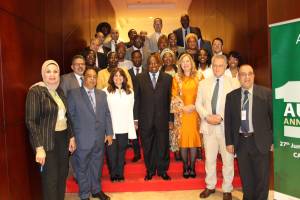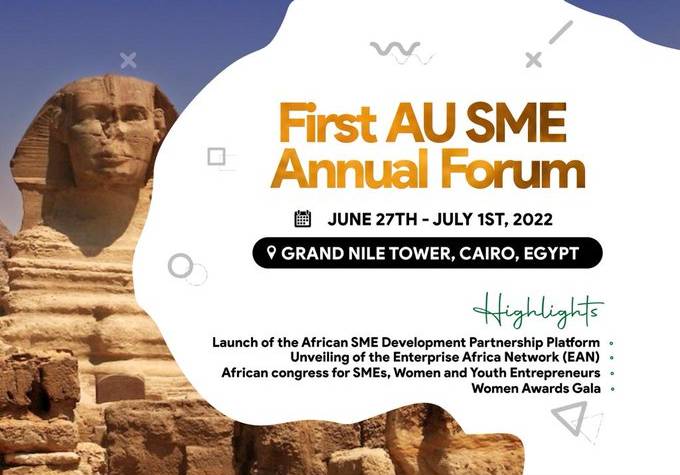Maiden AU SMEs Forum seeks an inclusive African SME sector
Between June 27 and July 1, the Department of Economic Development, Trade, Tourism, Industry, and Minerals (ETTIM) of the African Union Commission, in collaboration with the Africa Business Council (AfBC) and All Africa Association for SMEs (AAASME), hosted the first-ever African Union Annual SME Forum, in Cairo, Egypt.

The International Finance Cooperation says Micro, Small and Medium Enterprises (MSMEs) account for 90% of Africa’s business ecosystem, which makes them the continent’s primary providers of employment. Moreover, estimates by the World Economic Forum show the world’s workforce would increase by 910 million people in the period 2010 – 2050; over 90% of this increase will be in Africa, hence the need for the creation of productive employment opportunities.
Currently, despite their huge contribution to Africa’s economic development, SMEs remain largely isolated from the continent’s value chains and trading systems, which limits their capacity to formalize, grow and scale. As such, increasing job opportunities in Africa requires the strengthening of the continent’s SME value chains.
It was in recognition of SMEs’ vital role in accelerating economic development that the 20th Ordinary Session of the African Union Conference of African Ministers of Industry (CAMI 20) directed AU Member States to create an enabling environment for the creation and operation of SMEs. Consequently, the AU Commission developed the AU SME Development Strategy and Action Plan as policy guidelines “for promoting intra-regional and intra-African trade by integrating African MSMEs into regional and global value chains.”
To this end, the Department of Economic Development, Trade, Tourism, Industry, and Minerals (ETTIM) of the Commission, organised the first-ever African Union Annual SME Forum, in Cairo, Egypt, from June 27 – July 1. The Forum, themed: “Economic Empowerment of SMEs, Women and Youth Entrepreneurs to Realize Africa’s Industrialization in the context of the integrated market” was held in collaboration with the Africa Business Council (AfBC) and All Africa Association for SMEs (AAASME).
Amb Albert Muchanga, the AU Commissioner for Economic Development, Trade, Tourism, Industry and Minerals, while welcoming delegates to the Forum said the weeklong convening sought to leverage and harness MSMEs capacity to substantially contribute to Africa’s economic growth through innovation and creation of decent jobs for the continent’s young people. Muchanga lamented the fact that the Covid-19 pandemic and the Russia-Ukraine crisis had caused a massive disruption of global supply chains with adverse impacts on SMEs.
“This has caused financial pressures, led to the closure of some businesses and left some struggling to survive the tough working conditions. Therefore, SMEs deserve the full support of governments and communities across Africa to continue to create decent jobs and better livelihoods. Policy institutions should provide an enabling environment, including access to finance, information and markets. I also call on all Regional Economic Communities and Member States of the AU to domesticate the SME development strategy,’’ he urged.
Amb Kheswar Jankee, President/Founder of the All Africa Association for SMEs (AAASME), said unlocking the continent’s growth potential requires bridging the credit gap, strengthening of the SME value-chain and boosting productivity via technology adoption and adaptation. “Specific training workshops that will have a positive impact on African SMEs are most desirable owing to institutional and regulatory issues, the lack of access to finance, relatively low rates of business education and work experience, risk aversion,’’ Amb Jankee said.
Dr Amany Asfour, President of, Africa Business Council (AfBC), said for Africa to effectively operationalize the Africa Continental Free Trade Area (AfCFTA), the private sector and particularly MSMEs, women, youth, manufacturers associations and unions of industries, had to be at the centre of the continent’s industrialization efforts hence the need for their inclusion in awareness, capacity building, and information sharing activities.
“To effectively implement the AfCFTA we have to add value to raw materials before trading with ourselves. We have to trade in manufactured and value-added products by ensuring proper packaging, branding, designing, among others. Our SMEs need to produce competitive, qualitative and marketable goods and to achieve that, we need public-private sector dialogues, business development centers, technology hubs, among others,’’ Dr Asfour noted.
Dorothy Tembo, deputy director of the International Trade Center (ITC), said irrespective of the challenges bedeviling the growth of SMEs on the continent, the AfCFTA would be a game changer for SMEs’ growth.
“It provides a great window of opportunities for women and youth-led small businesses; it will provide wider markets and additional destinations for sale only if it has the right mechanism to support these businesses and this is where the implementation of the AU SME Development Strategy and Action Plan comes in. The launch of the Enterprise Africa Network at this annual convening is a significant milestone that will help grow a pool of competitive African businesses.”
One of the highlights of the Forum was the unveiling of the Enterprise Africa Network (EAN), which seeks to facilitate connectivity with regional and international markets and increase trade between African and international businesses through marketplaces and e-commerce. Among others, EAN would facilitate linkages with investment financing networks for SMEs and start-ups from selected sectors.
Moreover, the Forum featured the validation of the AU Women and Youth Financial and Economic Inclusion (WYFEI 2030) Strategy, which proposes a set of innovative, resilient and inclusive recovery solutions to assist women and young entrepreneurs to climb the ladder of change towards financial and economic inclusion. During a night of excellence organized by AAASME and AfBC, Amb. Muchanga was inducted into the Africa SME Hall of Fame “for his outstanding service and dedication to the promotion of the SME ecosystem in Africa.”
The maiden AU SME Forum, which seeks to promote, upskill and strategize for a better, more inclusive African SME sector to drive Africa’s industrialization, coincided with the United Nations MSME Day, celebrated every June 27. It seeks to create awareness about the contribution of small businesses to job creation, economic growth and increase awareness of their remarkable contributions to the achievement of the Sustainable Development Goals (SDGs).















